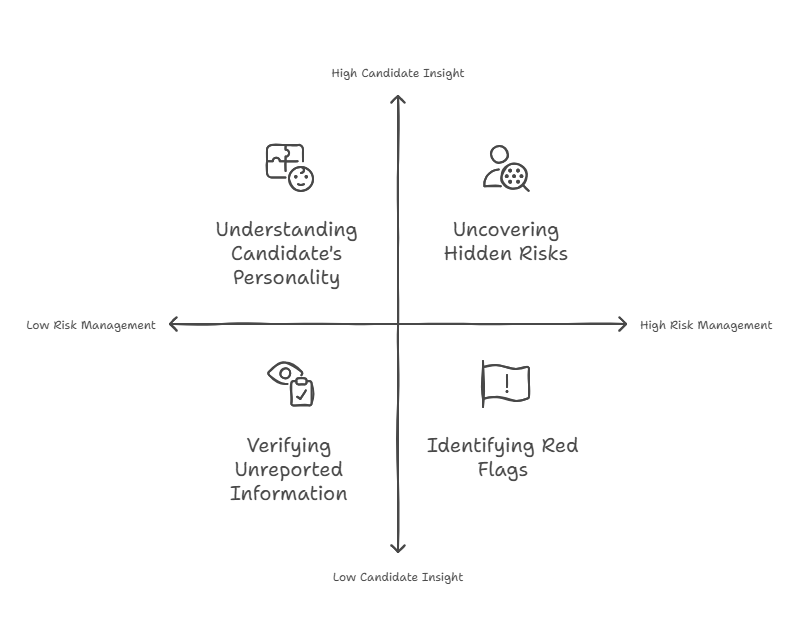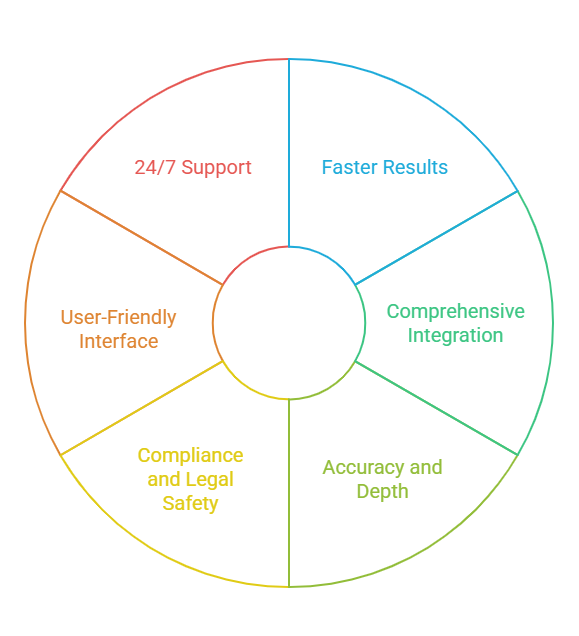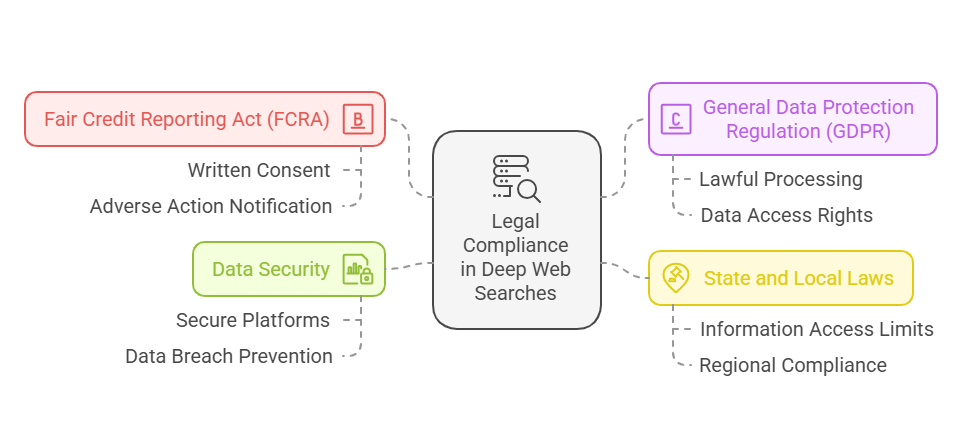Deep Web Searches and the Role of Background Checks in the Hiring Process
In the hiring process, background checks are an essential step for HR professionals, recruiters, and business owners. These Deep Web checks help to ensure that candidates meet the necessary qualifications and are trustworthy individuals. Typical background checks include criminal history, employment history, credit reports, and educational verification.
Background checks are crucial because they help businesses verify important information that might not be disclosed by the candidate. For instance, criminal background checks can identify past legal issues, while credit checks can provide insight into a candidate’s financial responsibility—especially important for roles that handle sensitive financial information.
However, traditional background checks only provide a limited view of the candidate’s qualifications and history. These checks mostly focus on public records and other readily available data. While effective, they may not provide a full, comprehensive picture of a candidate’s background. This is where deep web searches come into play, offering more detailed insights that can enhance hiring decisions.
Introduction to Deep Web Searches
The deep web refers to the vast part of the internet that is not indexed by traditional search engines like Google or Bing. It consists of databases, subscription-based services, private websites, and even password-protected content. In contrast to the surface web, which contains publicly available information, the deep web holds valuable data that can be accessed only through specific searches or permissions.
Conducting deep web searches involves accessing these hidden or non-indexed sources of information. These types of searches can help businesses uncover important insights about a candidate’s past or behavior that might not appear in conventional background checks. Examples of such hidden data include personal blogs, social media activity, online forum participation, and other forms of online content that provide deeper context about an individual.
By including deep web searches in the hiring process, employers can gain additional, often vital, information that enhances the decision-making process. This deeper insight helps businesses make better-informed hiring decisions by providing a clearer view of a candidate’s overall qualifications and personal history.
Importance of Deep Web Searches in Hiring
While traditional background checks verify basic, factual information, deep web searches allow employers to explore the candidate’s digital footprint in more detail. Here are some reasons why deep web searches are essential in the hiring process:

- Uncovering Hidden Risks: Deep web searches can reveal hidden details, such as participation in controversial online discussions, cyberbullying, or behaviors that might not be visible in traditional checks but could pose risks to the business.
- Verifying Unreported Information: Candidates may leave out certain details about their history or employment, but deep web searches can confirm this information through public profiles and online activity. For instance, a candidate may fail to mention a past job or omit certain achievements, but these can be revealed through deep web searches.
- Understanding a Candidate’s Personality: Through a candidate’s social media and online activity, deep web searches can provide insights into their personality, values, and behavior. This information can help assess whether a candidate is a good cultural fit for the organization.
- Identifying Red Flags: Sometimes, a candidate might hide specific negative experiences or behaviors. Deep web searches can help uncover such red flags, such as inappropriate online conduct, that would not appear in criminal or educational checks.
Key Comparison of Background Checks and Deep Web Searches for Hiring
| Feature | Background Checks | Deep Web Searches |
|---|---|---|
| Scope of Information | Limited to public records and official documents | Accesses hidden online profiles, forums, blogs, etc. |
| Speed of Results | Typically quick; processed in a few days | May take longer due to the need for deeper research |
| Risk Identification | Identifies criminal records, education, etc. | Uncovers behaviors, hidden online content, and personal details |
| Privacy Considerations | Follows established guidelines and laws (e.g., FCRA) | May raise privacy concerns depending on what is accessed |
| Cost | Generally cost-effective for standard checks | Can be more expensive due to the complexity of the search |
| Accuracy | Provides official, verified information | May contain unverified or subjective data, though highly valuable for context |
| Compliance | Typically compliant with hiring regulations (FCRA, etc.) | Must ensure compliance with privacy laws (e.g., GDPR, data protection) |
Deep web searches offer a more comprehensive, albeit sometimes more time-consuming and complex, way to understand a candidate’s history and behavior. While traditional background checks serve as the baseline for screening candidates, deep web searches can offer an additional layer of insights, which is particularly valuable for roles that require a high level of trust and transparency.
Comparing Deep Web Search and Background Check Integration: RapidHireSolutions vs. Competitors
Key Features Comparison: RapidHireSolutions vs. Competitors
When it comes to hiring solutions, integrating deep web searches with traditional background checks offers businesses a significant advantage. RapidHireSolutions provides an integrated service, combining both to offer a deeper, more comprehensive analysis of candidates. Let’s compare the key features of RapidHireSolutions with one of its competitors to see how each measures up in terms of speed, accuracy, integration, compliance, and more.
| Feature | RapidHireSolutions | Competitor |
|---|---|---|
| Deep Web Search Integration | ✅ Fully integrated | ❌ Separate service |
| Turnaround Time | ✅ 24 hours | ❌ 20-30 days |
| Search Accuracy | ✅ High accuracy and depth | ❌ Limited search depth |
| Compliance with Laws | ✅ Fully compliant (FCRA, GDPR) | ❌ Potential compliance gaps |
| User Interface | ✅ Simple, easy to use | ❌ Complex, hard to navigate |
| Customer Support | ✅ 24/7 availability | ❌ Limited business hours |
Advantages of RapidHireSolutions Over Competitors

- Faster Results: RapidHireSolutions provides background check and deep web search results within 24-48 hours, whereas competitors may take up to two weeks. This quick turnaround allows companies to move forward with hiring decisions without unnecessary delays.
- Comprehensive Integration: Unlike many competitors, RapidHireSolutions combines deep web searches directly with background checks, providing a unified platform for HR teams. This integration helps avoid missing critical information and makes the hiring process more efficient.
- Accuracy and Depth: The service offers a more in-depth look into candidates, accessing not only public data but also hidden content from the deep web, which includes forums, social media posts, and more obscure details. Competitors may miss this information or offer limited results.
- Compliance and Legal Safety: RapidHireSolutions adheres to privacy laws such as GDPR and FCRA, ensuring that businesses comply with legal requirements when using deep web searches for hiring. This reduces the risk of legal repercussions, unlike some competitors that may not fully comply with these standards.
- User-Friendly Interface: The platform is designed to be intuitive, allowing HR teams to quickly access and analyze candidate data. This is in stark contrast to competitors’ platforms, which may be more difficult to navigate and require additional training.
- 24/7 Support: With RapidHireSolutions, businesses have access to customer support at any time, ensuring they can get the help they need, even outside of normal business hours. Many competitors have limited support availability.
Key Drawbacks of Competitors
| Competitor Shortcomings | Details |
|---|---|
| Slower Turnaround Times | Competitors may take up to 20 days to provide results, slowing down the hiring process. |
| Limited Deep Web Search | Competitors may only offer surface-level searches, missing crucial information hidden in the deep web. |
| Legal Compliance Gaps | Some competitors may not fully comply with necessary privacy laws, increasing legal risks. |
| Complex User Interfaces | Complicated platforms can lead to inefficiency and require more time for HR teams to learn and navigate. |
Why RapidHireSolutions Stands Out
RapidHireSolutions excels in providing a seamless integration of deep web searches with traditional background checks. The speed and accuracy of the service allow HR teams to make informed hiring decisions much faster than with competitors. The combination of a user-friendly platform, robust customer support, and full compliance with privacy laws ensures that businesses are protected and well-equipped to hire the best candidates.
With competitors lagging behind in terms of speed, accuracy, and legal compliance, RapidHireSolutions stands as the clear choice for HR teams seeking a thorough, efficient, and legally sound hiring process.
Legal Considerations: Ensuring Compliance in Deep Web Searches
When incorporating deep web searches into the hiring process, businesses must be vigilant about legal regulations to avoid any compliance issues. Deep web searches may uncover sensitive or personal information, which requires strict adherence to privacy and data protection laws. Here are the key legal considerations:

- Fair Credit Reporting Act (FCRA): The FCRA governs how background checks are conducted, including the use of deep web searches. It mandates that candidates must provide written consent before employers can conduct a background check. Additionally, if any adverse action is taken based on the results (such as not hiring a candidate), the employer must notify the candidate and provide them with a copy of the report.
- General Data Protection Regulation (GDPR): For businesses operating within the EU or hiring candidates from EU countries, GDPR compliance is crucial. GDPR requires that personal data be processed lawfully, transparently, and for specific purposes. It also gives candidates the right to access, correct, and erase their personal data. Deep web searches must ensure compliance with these regulations by gathering only necessary and relevant information, while safeguarding the privacy of candidates.
- State and Local Laws: Depending on the jurisdiction, additional laws may apply to deep web searches and background checks. For example, certain states have laws limiting the types of information that can be accessed or used in hiring decisions. Businesses must stay up to date with local legislation to ensure they are compliant with regional rules and regulations.
- Data Security: Another legal concern when using deep web searches is the security of the collected data. Employers are required to protect candidates’ personal information from breaches or unauthorized access. Adopting secure platforms, such as RapidHireSolutions, which comply with industry standards for data protection, is critical to mitigating risks.
By partnering with a compliant provider like RapidHireSolutions, businesses can ensure they follow legal protocols while benefiting from comprehensive hiring insights.
Frequently Asked Questions (FAQs)
How do deep web searches differ from regular background checks?
Regular background checks typically focus on information available on the surface web, such as criminal history, education verification, and employment history. Deep web searches, on the other hand, access non-public, less easily discoverable information, including social media profiles, forum posts, and data from private databases. This deeper search can provide valuable insights into a candidate's behavior, character, or past actions that might otherwise remain hidden.
What information can deep web searches uncover?
Deep web searches can uncover a variety of hidden data, such as:
-
- Social media activity (private posts, messages)
- Forum posts and blogs
- Comments or reviews on niche websites
- Mentions in news articles or private databases
- Unlisted or archived information that isn't indexed by traditional search engines
Are deep web searches legally compliant for hiring purposes?
Yes, deep web searches can be legally compliant as long as they are conducted within the boundaries of applicable laws, such as the FCRA, GDPR, and local regulations. Employers must obtain consent from candidates before conducting such searches, and ensure they use the data ethically and responsibly.
How does RapidHireSolutions ensure data privacy and compliance?
RapidHireSolutions is fully committed to privacy and compliance. The platform integrates secure encryption methods and adheres to industry regulations such as GDPR and FCRA to protect candidate data. RapidHireSolutions also ensures that all data retrieved through deep web searches is relevant and used only for the intended purposes, thus maintaining strict compliance with privacy laws.
Conclusion
In today’s fast-paced hiring environment, making informed decisions is more crucial than ever. Integrating deep web searches with traditional background checks allows businesses to uncover hidden information, giving them a more complete picture of a candidate’s qualifications, character, and potential red flags. With RapidHireSolutions, companies can streamline this process, ensuring they have access to the most thorough, accurate, and legally compliant hiring insights.
By offering rapid turnaround times, an intuitive platform, 24/7 support, and a comprehensive suite of background checks and deep web search capabilities, RapidHireSolutions positions itself as the go-to provider for modern hiring solutions. Businesses looking to enhance their recruitment processes and make faster, more informed decisions should consider utilizing the powerful combination of deep web searches and traditional background checks offered by RapidHireSolutions.
This ensures not only better hires but also reduced risk, improved compliance, and a more efficient recruitment process overall.

